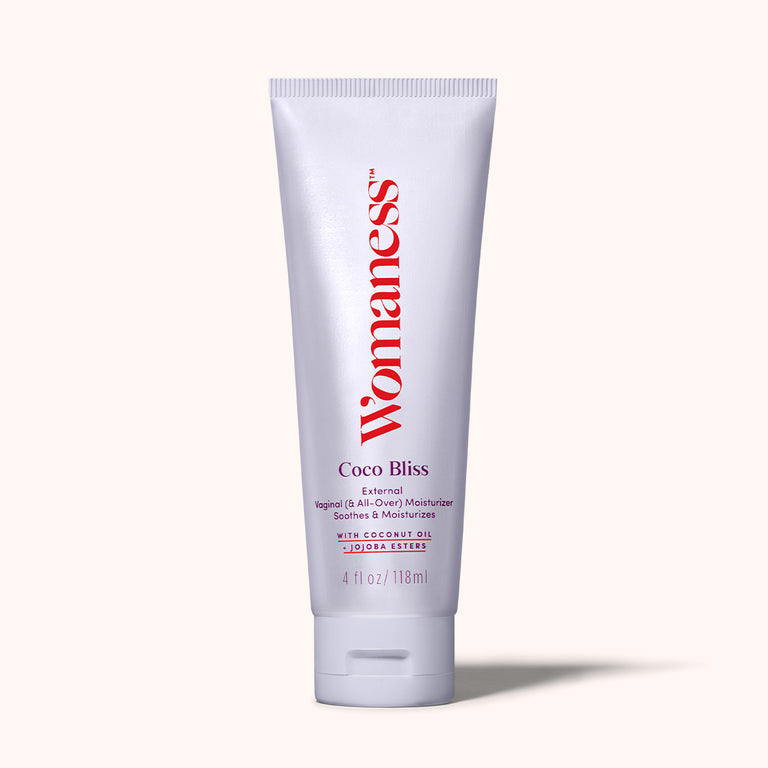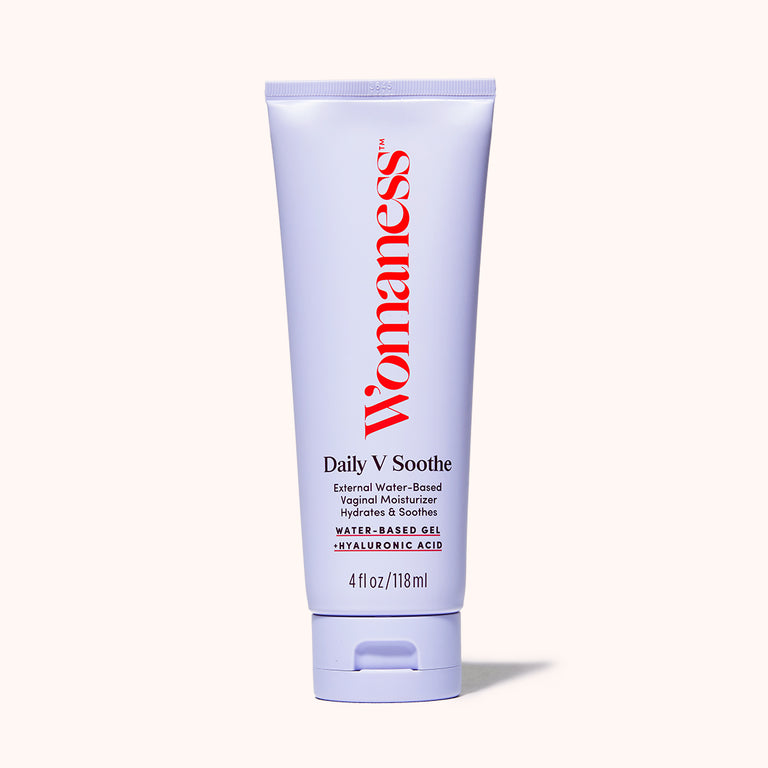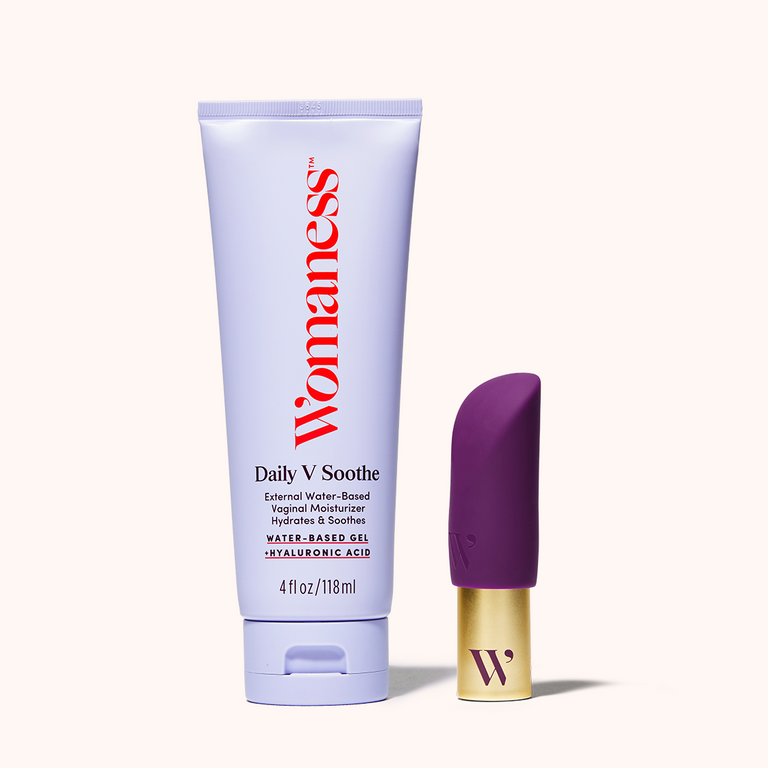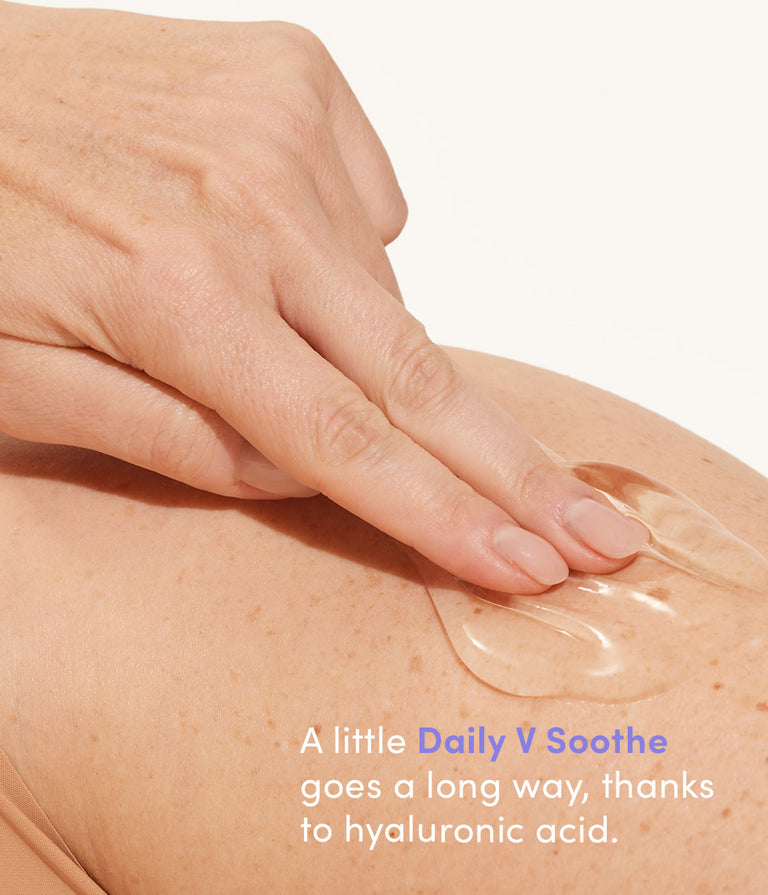By Julia Walker, RN, BSN 5-Minute Read
Julia Walker, RN, BSN is a women's health nurse, writer, and member of the perry team. Perry connects and supports perimenopause warriors in a safe space—to build friendships, learn, and laugh. The moment you think "WTF, could this be menopause?"—join our sisterhood!
While the state of your V goes through many changes each month, year, and decade, there is a decidedly profound and prolonged occurrence that happens in the lead up to and during menopause: vaginal dryness. Most women find that their natural vaginal moisture starts to go away once they enter perimenopause and does not return. While at first this can seem like just an irritating inconvenience, it has larger ramifications; making sex painful, everyday activities uncomfortable, and potentially leading to other complications like infections. Below, we unpack the reasons behind the arid conditions, and what you can do to help say goodbye to unwanted vaginal dryness.
What Causes Vaginal Dryness?
Vaginal dryness is one of the symptoms of genitourinary syndrome and is common in perimenopausal and menopausal women. A decrease in your estrogen levels can change the amount of natural lubricant your vagina produces. Estrogen is responsible for not only keeping your tissues moist but also helps keep your skin plump and healthy. When estrogen levels decline, you have less blood flow directed to your vagina and vulva, which means fewer nutrients and healing cells are traveling to the area.
The main side effects are irritation and discomfort throughout the day due to the lack of moisture. Dryness can be especially noticeable and irritating when you are exercising or sexually active. Often, women start to steer clear of sexual activity because it becomes too painful. However, there are various solutions to help keep you comfortable in your day-to-day activities and during sex.
One of the most well-known ways to counter vaginal dryness is by using vaginal estrogen to help replenish the tissues. However, not all women are interested in this approach, or able to use vaginal estrogen, so let's investigate some other more natural solutions for increasing your own natural lubrication.
#1. Use Vaginal Moisturizers and Lubricants Without Fragrances and Synthetic Chemicals
If vaginal estrogen is not for you, you can use other forms of non-hormonal vaginal lubrication, including vaginal suppositories and moisturizers that act as vaginal skincare. When looking for a product, make sure it is free of synthetic chemicals and perfumes, as products with those compounds can irritate and dry the tissues in and around your vagina. Additionally, some women may even have an allergic response to these compounds, which would further aggravate your already irritated skin.
We recommend Daily V Soothe as a non-irritating, fragrance-free option
#2. Exercise Regularly
You will want to keep directing the blood flow to your pelvic region, and a great way to do that is to start moving your body. Exercise helps strengthen the muscles of your pelvic floor, which draws more blood into that area and helps increase muscle tone. Better muscle tone can help with bladder control and pelvic strength as you get older. Not to mention, exercise increases serotonin, which is your feel-good hormone. Intriguingly, serotonin may also boost estrogen levels, which in turn may improve those bothersome menopause symptoms like vaginal dryness.
#3. Stay Sexually Active
One of the best ways to increase blood flow to your vaginal and vulvar tissues? More sex. This extra blood flow brings in oxygen, nutrients, and healing cells to repair sore tissues. Penetrative sex may not be appealing if you are particularly irritated. However, the good news is your brain will still direct blood to your tissues with any sexual activity that leads to arousal. So, whether you get physical with a partner or solo, try to do this regularly, and make sure to have plenty of lube to keep comfortable.
#4. Choose the Right Lube for You
Using a good lubricant during sex is key to enjoying sex, staying comfortable, and avoiding abrasions and tears. There are various types of lubricants and vaginal moisturizers on the market, including silicone-based, water-based, and oil-based lubes. Each lubricant has pros and cons, but a lot of women prefer silicone-based lubricants because you don’t have to interrupt intimacy to re-apply as often and it is a non-irritating, hypoallergenic product. It is also safe to use with condoms.
When looking for a lube, you will want to keep in mind that every woman has a different vaginal flora, so certain ingredients and bases may cause more irritation than others. Try a few different lubes out to see what feels best to you.
For an oil-based option, we recommend Coco Bliss
#5. Eat a Clean, Healthy Diet
Food is a powerful way to boost your natural estrogen levels and improve vaginal lubrication. Barringa health condition that precludes eating estrogenic foods, you may benefit from eating foods like soy, flaxseeds, legumes, carrots, and stone fruits. You will also want to be mindful of eating foods that can increase yeast and the number of not-so-great bacteria, as vaginal infections can become more commonplace in menopause and beyond.
#6. Try Pelvic Floor Therapy
More and more women are concentrating their physical activity on strengthening their pelvic floor. Indeed, many physical therapists and health providers specialize in helping women optimize this area of the body. Talk to your doctor or meet with a pelvic floor specialist who can help you with exercises to strengthen your pelvis. They may even recommend you try devices such as a vaginal dilator, which comes in different sizes based on your needs.
#7. Stay Hydrated
Water is one of the best remedies for dryness anywhere on your body, including your nether regions. However, as people get older, the thirst hormone becomes less potent, so it is common to feel less thirsty. Remind yourself to drink regularly by having water on hand wherever you go, and even force yourself to drink at specific intervals, such as when you get home from running errands or before a meal.
More Menopause Must-Reads
What’s Happening Here? Hot Flashes
Perimenopause: All You Need To Know
Menopause Recommended Reading









